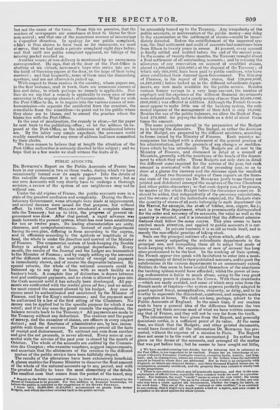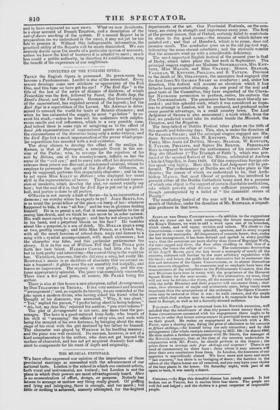PUBLIC ACCOUNTS.
DR. BOWEING'S Report on the Public Accounts of France has been in our possession two or three weeks, during which Ice have
occasionally turned over its ample pages.* Into the details of this valuable document it is not our purpose to enter ; but as our own Accounts will very shortly have to undergo a thorough revision, a review of the system of our neighbours may not be without use.
Under the old rfigime of France, the public accounts were in a state of the greatest confusion and complexity. During the Revo-
lutionary Government, some attempts were made at improvement,
and several decrees were issued for that purpose, but without effect. In 1808, Count MOLLIEN introduced a complete change into the Treasury; but up to 1816, the progress of general im-
provement was slow. After that period, a rapid advance was made towards the present system, which has now been established for ten or twelve years. Its leading characteristics are unity, clearness, and comprehensiveness. Instead of each department having its own plan, differing in form according to the caprice, and in efficiency according to the aptitude or inaptitude of its head, the whole is under the direction and control of the Minister of Finance. The commercial system of book-keeping (by Double Entry) is adopted in all the principal departments. Every month, the results of the Journal and the Ledger are transmitted to the Minister of Finance; and by simply adding up the amounts of the different returns, the sum-total of receipt and payment is immediately shown, and of course the disposable balances. By special returns, the whole of the national accounts could be balanced up to any day or hour, with as much facility as a banker's book. A complete line of distinction is drawn between real and contingent payments, and no claim is allowed to pass into the Cash account until it has actually been discharged. All pay-
ments are confronted with the credits given ad hoc; and no minis- ter must exceed the amount allowed by his budget. Any case of
excess must be authenticated and sanctioned by the Minister of Finance, and by the King's ordonnances ; and the payment must be authorized by a law at the first sitting of the Chambers. No money can be applied but to the specific purpose for which it was voted; and if in any case the grant exceeds the expenditure, the balance reverts back to the Treasury-A. All payments are made to the Treasury without any deductions. The receiver and the payer of money, and the examiner of claims, are officers in every respect distinct; and the functions of administrator are, by law, incom- patible with those of receiver. The accounts present all the facts of receipt and disbursement. To subtract one sum from another and give the net proceeds, is never allowed. Every account con- nected with the service of the past year is closed by the month of October. The whole of the accounts are audited by the Commis- sion des Comptes •' who examine vouchers, suggest improvements, and ascertain that the allotments of the revenue to the different anches of the public service have been faithfully obeyed. The results of the alterations have been extensively beneficial. A glance enables the Finance Minister to discover the final amount of the whole of the national accounts up to any period, and with the greatest facility to trace the most elementary of the details. The smallest sum that comes from the pocket of the taxed, may
• Report on the Public Accounts of France, by Jolts: BOWR/NG ; ordered by the House of Commons to be printed. For this addition to financial knowledge, we believe the public is indebted to the suggestions of Sir HENRY PARNELL.
t Since 1814, 60,00(1,000f. (2,441,00t1L) accumulated on grants from former Budgets, and which therefore reverted back to the public service.
be accurately traced up to the Treasury. Any irregularity of the public accounts, or malversation of the public money—ally delay in the examination or the settlement of claims—would be imme- diately detected. Before. the establishment of the improved sys- tem, the final settlement and audit of accounts had sometimes been from fifteen to twenty years in arrear. At present, every account is finally settled and audited before the end of the second year. In the course of twenty-three months, the Treasury brought about a final settlement of all outstanding accounts ' • and by refusing the allowance of any reservation on account of unsettled claims, placed 11,000,000f. (450,0001.) at the disposal of the Treasury ; of
which only 900,000f. have been paid to public creditors, who have since established their demand upon Government. The Minister of Finance, in his report of 1830, states, that 120,000,0001.
(4,800,0001.) before locked up in the different subordinate depart-
ments, are now made available for the public service. Besides various former savings to a very large amount, the number of
employfis and the expenses of the different financial departments were reduced one half, and a yearly saving of more than 20,000,000f. (800,000/.) was effected in addition. Although the French Govern- ment appear to make little use of the banking system, the esti- mated expense of the management of their debt. is only 10,0001. Besides the use of the public balances, we allow the Bank of Eng- land 270,000/. for paying the dividends on a debt of about three times the amount.
The same principles prevail in the preparation of the Budget as in keeping the Accounts. The Budget, or rather the divisions of the Budget, are prepared by the different ministers, according to forms issued by the Ministry of Finance. Each minister ac- companies his budget with a statement of the general position of his administration, and the grounds of any changes or modifica- tions which he has introduced. The Budgets are all sent tc; the Ministry of Finance, and discussed in detail at a council of Ministers, generally with the assistance of the heads of the depart- ment to which they refer. These Budgets not only state in detail the different sums required for the service of the year, but each amount is contrasted with that of the preceding year, so as to show at a glance the increase and the decrease upon the smallest item. About two thousand copies of these reports on the finan- cial state of the country (as Dr. BOWRINO justly terms them) are printed and distributed amongst the members of the two Chambers and other public characters; so that each deputy can, if he pleases be master of the whole Budget before the discussion comes on. should be added, that independently of the pecuniary calculations, and the returns of all the individuals employed, the Budgets state the quantity of stores of all sorts belonging to each department (in the Marine, for example, the stock of timber, iron, copper, &c.); and in the War department, which is preeminently distinguished for the order and accuracy of its accounts, the value as well as the quantity is recorded, and it is intended that the different adminis- trations shall follow the same course. This plan seems to have excited much attention, and applied to public accounts it is cer- tainly novel. In private business it is as old as trade itself, and is merely the non-official practice of taking stock. Such are the principal outlines of a system which, after all, con,- sists in merely subjecting the subordinate departments to the principal one, and compelling them all to adopt that mode of book-keeping which the experience of men of account has long since pronounced to be the best. In the working of their system, the French appear (we speak with hesitation) to enter into a need- less complexity of detail in their published accounts, and to push the subdivisions in the various departments to an unnecessary extent. Neither do they seem to have availed themselves of the assistance the banking system would have afforded; whilst the power of issu- ing ordonnances is liable to much abuse, owing to the very great discretionary power it placesin the Crown. With these drawbacks —which are easily avoided, and some of which may arise from the French mode of taxation—the system appears perfectly adapted to guard against fraud, misapplication, obscurity, or delay, and to be worthy to supersede the discordant, cumbrous, and complex modes in operation at home. We shall ere long, perhaps, advert to the Public Accounts of England. In the mean time, if our readers wish to have a general idea of the difference between the two systems, :g; let them reverse most of what we have written concern- ing that of France, and they will not be very far from the truth. The information we have given from the Report, and generally ipsissirnis verbis, is a sufficient proof of its value. At the same
time, we think that the Budgets, and other printed documents,
would have furnished. all the information Dr. BOWRING has pre- sented, without the expense of a mission to Paris. The Report
does not seem to be the work of an accountant. § Its author has given us the forms of the accounts, and arranged all the matter that was put before him; but he seems to have sought out little,
* We have avoided entering into details, but the following fact in reference to the Post Office, is too important to be omitted. France has an interchange of ac- count with every European linaetrophe country, excepting Spain, Austria, and Eng- land ; and, in consequence, letters are returned to the writers when the individual cannot be found to whom they are addressed. But as there is no reciprocity with England, no letters are returned thither; and three thousand English letters are, in consequence, annually sacrificed, and the property they may contain is wholly lost to the proprietors. § There is one omission which may be.practically injurious, and that is the non- explanation of official terms, especially when common words are used in a peculiar sense. For instance, the word credit" seems to mean the sum voted ; the terms "national or state creditor," the pa-ty for whose pay it is voted, or, in fact, any one who may have a claim against the Government, whether for wages, for salary, or for work done. This use of the words "national or state creditor," is so contrary to our custom, that it might very much puzzle a lord or a squire, and even create a• prejudice in his mind against the whole system. and to have originated no new views. What we now desiderate, is a clear account of French Taxation, and a deseription of the out-of-doors working of the system. If a second Report be in preparation (as we understand is the case), it may not yet be too late to procure it. Without this indispensable information, the practical utility of the Reports will be much diminished. We can scarcely decide upon the merits of a particular system of accounts, unless we know the kind of business it is adapted to meet ; much less could a public authority, in directing its establishment, reap the benefit of the experience of our neighbours.



























 Previous page
Previous page